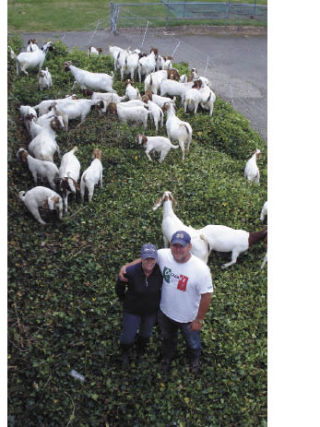After a year and a half, Paul and Patty Fantello’s goats are making a name for themselves and the Enumclaw couple.
Not only are the 160 registered, full-blood South African Boer and Boer crosses growing in popularity for their meat these days, but now the herd is earning its keep – those billies, nannies and kids are working for a living.
Earlier this summer, the Fantellos turned a bleeting and lively three to four dozen goats loose outside the Enumclaw Aquatic Center, where, in front of a small crowd of onlookers, they chomped through piles of ivy on the north side of the building.
“This is so great,” Enumclaw Aquatics Coordinator Brandi Christman said. “When we first started talking about this I was joking around.”
Patty Fantello works with Christman at the pool. For some time, Christman had wanted to pull out the ivy, flatten the berm and create much-needed additional handicap parking spaces near the front door. A television commercial jesting about goats clearing land led to some good-natured ribbing about Fantello’s goat herd.
“I’ve got goats they’ll eat it down,” Fantello said.
In the end, the two decided to give the goats a shot. Fenced in and heavily watched, in about 10 hours, the goats munched and chomped until the area was stripped and cleared.
The pool project was their first “official” job. At home, the herd cleared 20 acres of blackberries in three months.
“They did a fantastic job,” Fantello said.
“I’m excited that we were able to bring local groups into the mix and get a project started and eventually done and done green,” Christman said. “I think any time the city is able to support local groups and it is a win-win for everyone it is just great.”
There’s still work to be done at the pool. Christman has a couple of community groups lined up to do some of the clearing work that remains, before she can move forward with the additional parking spaces.
With their part of the project complete, the goats headed back to Fantello Farms on the fertile slopes of Enumclaw’s Newaukum Creek.
The registered herd is raised primarily for reproduction and meat.
The South African Boer goats were introduced to America in the early 1990s. Paul Fantello said $43 million in goat meat is consumed in the United States a year, at least half is imported from Australia and New Zealand.
“We come nowhere near producing enough,” he said. “They are the black Angus of the goat world and fast growing.”
“Goat meat is extremely lean, tastes like pork and is rich in protien and iron,” Patty Fantello said.
The Fantellos are part of the Puget Sound Meat Producers Cooperative, which has been instrumental in getting a mobile slaughter truck up and running.
“We already have three high-end Seattle restaurants asking for our goats,” Patty Fantello said.
There are a number of advantages to raising goats, she said. They are cost effective and “they’re not heavy grain eaters.”
Goats are also noted for being docile, fast-growing and having high fertility rates. They make great 4-H and FFA projects.
The Fantellos’ son Kelvin Cyr, 11, earned 4-H grand champion, Wether class, with his 80-pound, Wether South African purebred Boer goat at Enumclaw’s King County Fair. He will now compete in the state contest at the Western Washington State Fair in Puyallup in September.
Also in September, Patty said, Fantello Farms is planning a herd reduction sale. For more information, call Fantello Farms at 253-255-5690.
To comment on this story, view it online at www.courierherald.com. Reach Brenda Sexton at bsexton@courierherald.com or 360-802-8206.


